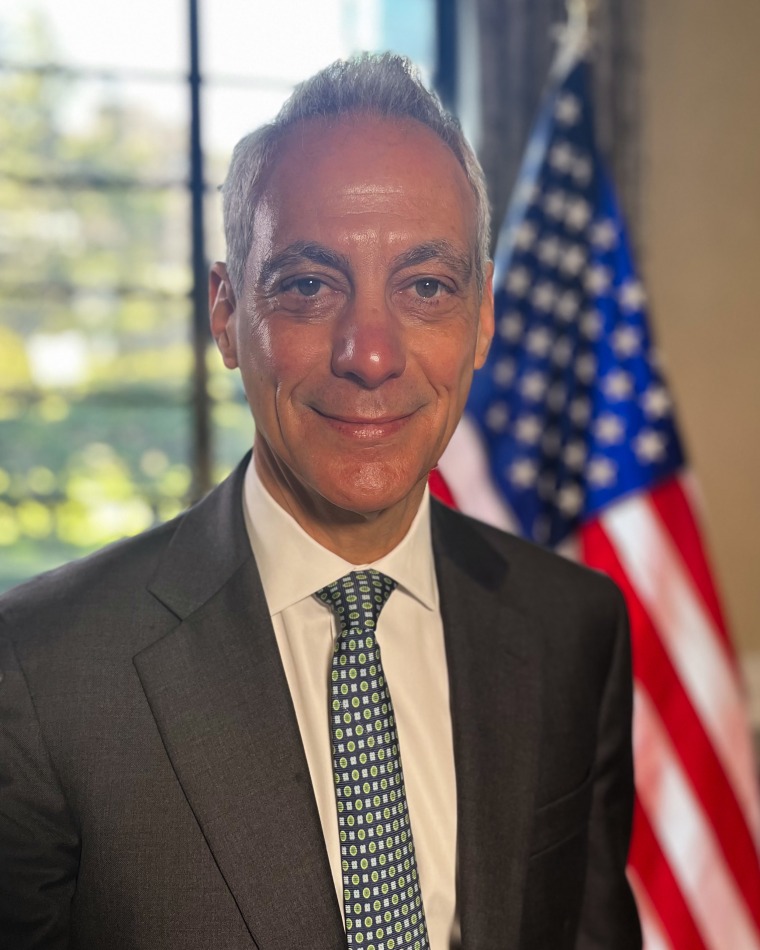In countering China, U.S. sees a growing role for Japan
OKINAWA, Japan — The United States’ alliance with Japan is evolving to counter an increasingly “untethered” China, Washington’s envoy to Tokyo told NBC News in an exclusive interview this week.
“They have been more aggressive, as we have from purely a strategic standpoint of putting our roots down even deeper in the area at the behest of regional allies,” U.S. Ambassador to Japan Rahm Emanuel told NBC News in Tokyo on Thursday, referring to Beijing.
The U.S.-Japan relationship “is evolving from one that was always focused on alliance protection” to one focused on “alliance projection,” Emanuel said. That means asserting U.S. and Japanese influence around the Asia-Pacific region, including through broader partnerships such as Washington’s AUKUS security alliance with Australia and Britain and the Quad, a security grouping made up of the U.S., Australia, India and Japan.
Read more on this story at NBCNews.com and watch “NBC Nightly News with Lester Holt” tonight at 6:30 p.m. ET/5:30 p.m. CT.
NBC News spoke to Emanuel as U.S. and Japanese forces participated in joint drills known as “Iron Fist,” which have taken place annually since 2006 and moved to Japan from California last year. They underscore the urgency with which Washington is shoring up security partnerships in the Asia-Pacific region, where China, Russia and North Korea pose growing threats.
The Biden administration is counting on Japan, a U.S. ally since the end of World War II, to sharpen its regional defense posture, particularly as China builds its military power.

“In the region, the United States and Japan are united — politically, diplomatically, economically, strategically — because they are an effective deterrent against an untethered China,” Emanuel said. That deterrence is effective, he said, because it underscores “that we’re the permanent Pacific power — you can bet long on America.”
On Tuesday, Maj. Gen. Hajime Kitajima, commander of the Japan Ground Self-Defense Force’s Amphibious Rapid Deployment Brigade, said the country was “facing the most severe security environment since the end of World War II.”
Speaking at a news conference in Okinawa, Kitajima cited Russia’s 2022 invasion of Ukraine, saying one of the major lessons from the conflict was that “there are actual states that will invade another country if they are perceived as not having sufficient strength to defend itself.”
Emanuel said other Asia-Pacific countries with worries about China were reassured by the U.S.-Japan alliance. Japan hosts more U.S. troops — about 54,000 — than any other country in the world. Roughly half of them are in Okinawa, the southernmost prefecture of Japan.
Earlier this week, an amphibious vehicle roared onto an Okinawa beach with a deafening sound, its massive propellers whirring furiously.
As its air cushion deflated, the vehicle slumped to the ground on a small stretch of beach on Okinawa’s main island.
A ramp came down to allow light armored vehicles onto the beach, along with U.S. Marines, U.S. Navy sailors and members of the Japan Self-Defense Forces, all participating in a joint military exercise meant to simulate the retaking of an island.
Troops set up sensors along the beach that can detect divers, small boats — or something larger — and then pass that information on to U.S. and Japanese ships.
“This system can see up to 100 nautical miles,” Lance Cpl. Aidan Henson of the 31st Marine Expeditionary Unit said as he pointed at a computer.
The three-week U.S.-Japan military exercises, which take place all over Japan and run until Sunday, are not explicitly aimed at any particular country. But both countries are increasingly concerned about potential conflict with China, whether over its military activities in the South China Sea or its designs on the self-ruling island democracy of Taiwan.
In a sign of the importance of the U.S.-Japan relationship, President Joe Biden has invited Japanese Prime Minister Fumio Kishida to Washington for a state visit next month. While there, the Japanese leader will also address a joint session of Congress.
China is far from the only security concern for Japan, where Okinawa residents are sometimes urged to take shelter during North Korean missile tests. The isolated communist country has accelerated weapons testing in recent years in what analysts say is an effort to pressure the world into accepting it as a nuclear power.
Under a new security strategy adopted in 2022, Japan has moved to bolster its military power in a major shift away from the self-defense-only principle that has guided the country since the end of World War II.
In December, Japan’s Cabinet approved…
Read More: In countering China, U.S. sees a growing role for Japan

